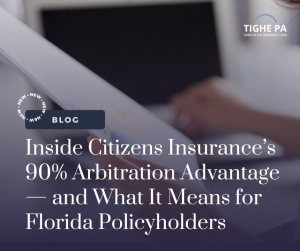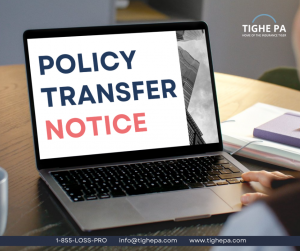When the Rules Change Overnight
Most Floridians know insurance is complicated. What many don’t realize is that the rules for fighting your insurance company can change — and sometimes, not in your favor. Citizens Property Insurance Corporation, the state-backed “insurer of last resort,” now has the power to move disputes out of circuit courts and into a special arbitration system before the Florida Division of Administrative Hearings (DOAH).
On the surface, this shift is supposed to make things faster and cheaper. In reality, Citizens is winning more than 90% of these cases — a staggering difference from the just-over-50% success rate it sees in traditional courts.
Whether you own a single home or manage multiple commercial properties, this change matters. For businesses, the risks are even higher.
A Shortcut Through the Legislature
So how did we get here? In 2023, Florida lawmakers approved legislation allowing Citizens to include an arbitration clause in its policies. Beginning in February 2023, this gave Citizens the right to reroute disputes into DOAH instead of the courts.
“As lawyers, we believe that everyone should have a right to their day in court, and are generally against arbitration clauses that strip this important right away.” – Dan Tighe, Esq.
Lawmakers argued the move would reduce legal costs, unclog backlogged courts, and deliver speedier outcomes. But there’s a catch: arbitration isn’t the same as court. The rules are different, the process is more restrictive, and some of the fundamental rights property owners expect — like robust discovery and access to a jury — don’t carry over.
The promise of efficiency rings hollow if fairness is left behind.
One Family’s Story: $40,000 in Damage, No Relief
To understand how this works in practice, consider an example of the Smith family, a retired couple in Fort Lauderdale. After finding water pooling in their kitchen, they filed a claim with Citizens. The insurer quickly denied it, claiming the damage came from a long-term leak excluded under their policy. Eleven days later, a plumber found the actual source — a hidden pipe leak inside an exterior wall. The repair bill climbed close to $40,000.
When the Smith’s challenged the denial, they expected their day in court. Instead, Citizens rerouted them to DOAH arbitration. There, the judge blocked their attorney from deposing a key adjuster and limited their ability to gather evidence. The process ended with Citizens prevailing — just as it has in the overwhelming majority of these cases.
For the Smith’s, the outcome was devastating. For business owners with larger claims, the stakes are even higher.
Numbers That Tell the Story
Since February 2024, Citizens has diverted more than 1,500 disputes into DOAH. The results are lopsided: Citizens wins more than 90% of the time. In one sample of 38 arbitration cases, Citizens won every single one.
This isn’t just about efficiency. It’s about imbalance. When one party wins nearly every time, it’s fair to ask whether the system itself is stacked.
Why Property Owners Are Losing Ground
For homeowners, the DOAH process is frustrating. For businesses, it can be catastrophic. Commercial properties involve higher-dollar claims, complex causation issues, and potential business interruption losses. Yet the arbitration system narrows the tools available to policyholders:
- Limited discovery: Judges have blocked depositions of adjusters who made key decisions.
- Restricted exits: Owners can’t simply withdraw from arbitration and head back to court without risking fees or penalties.
- Conflict concerns: Some judges have refused to disclose potential conflicts of interest, leaving policyholders questioning neutrality.
When the rules tighten, leverage shifts — and almost always in Citizens’ favor.
Citizens’ Defense — And Its Limits
Citizens and its supporters insist the system works. They point to three main justifications: speed, cost, and expertise.
- Speed: Arbitration can move faster than Florida’s overburdened courts. But for major commercial claims, rushing through a process can mean missing critical facts.
- Cost: The process cuts legal expenses for Citizens. Yet if those savings come at the expense of a fair hearing, the trade-off favors insurers, not property owners.
- Expertise: Administrative law judges are billed as specialists. But when one side wins more than 90% of the time, expertise doesn’t equal balance.
The justifications sound good in theory. In practice, they leave too much room for abuse.
The Risks for Commercial Property Owners
If you own or manage commercial property in Florida, the risks are real and immediate:
- High-dollar exposure. Storm, fire, or water damage can quickly add up to six- or seven-figure claims. Losing in DOAH can upend your finances.
- Business interruption. Disputed claims don’t just affect buildings; they halt revenue streams and operations.
- Uncertain precedent. Unlike public court decisions, arbitration rulings don’t create consistent rules for the future.
- Cash flow shocks. Losing at DOAH can even mean paying Citizens’ attorney’s fees, piling costs on top of denied coverage.
Insurance is supposed to stabilize risk. But under this system, it can magnify it.
Where This Could Lead
Some judges have already paused DOAH proceedings, citing due process concerns. Constitutional challenges are brewing over jury rights and impartiality. Pressure is building on lawmakers to revisit the system.
But reforms move slowly. Property owners can’t afford to wait for the legislature to fix the imbalance. If storms strike tomorrow, the system as it stands will govern your claim.
What You Can Do Now
There are steps every property owner — especially commercial ones — should take immediately:
- Check your policy. See if it includes Citizens’ arbitration clause.
- Document thoroughly. Keep photos, inspection reports, estimates, and communications. In limited-discovery forums, documentation matters even more.
- Move quickly. Early action preserves more options in disputes.
- Get representation. Experienced legal help can identify whether arbitration is enforceable in your case and how best to challenge a denial.
Being proactive now is far less costly than fighting blind later.
Don’t Wait for the Next Storm
Florida’s new arbitration system may be faster, but speed without fairness is no bargain. When Citizens controls the forum, it usually wins. For commercial property owners, that can mean six- or seven-figure losses, stalled businesses, and mounting costs.
You don’t have to wait until disaster strikes to protect yourself. If you’re facing a property damage claim — or want to understand your risks before the next storm — Tighe P.A. can help level the playing field. Our team fights to ensure your rights are protected and your claims get a fair hearing.
Relevant Resources and Citations
- Ariza, Mario. A Florida Home Insurer Was Allowed to Bypass the Courts During Claim Disputes. It Won More Than 90% of the Time. ProPublica, Sept. 15, 2025.
- Insurance Journal. Citizens Property Wins All Arbitration Cases, Raising Due Process Concerns. July 2025.
- Axios Tampa Bay. Florida Property Insurance Lawsuits Shift to Arbitration. Sept. 2025.
You May Also Like:
- The $112,500 Mistake: Why Coinsurance Can Gut Your Commercial Claim
- California: How to File a Property Insurance Complaint and Protect Your Rights
- Illinois: How to File a Property Insurance Complaint and Protect Your Rights
- Massachusetts: How to File a Property Insurance Complaint and Protect Your Rights


